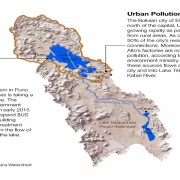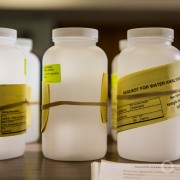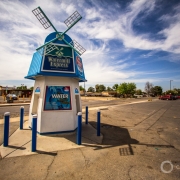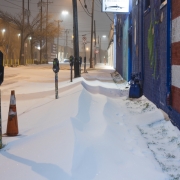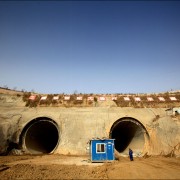Amid Political Quarrels over Cape Town Crisis, Engineers Prepare Dams for Day Zero
Equipment is in place to pull water from the bottom of reservoirs.
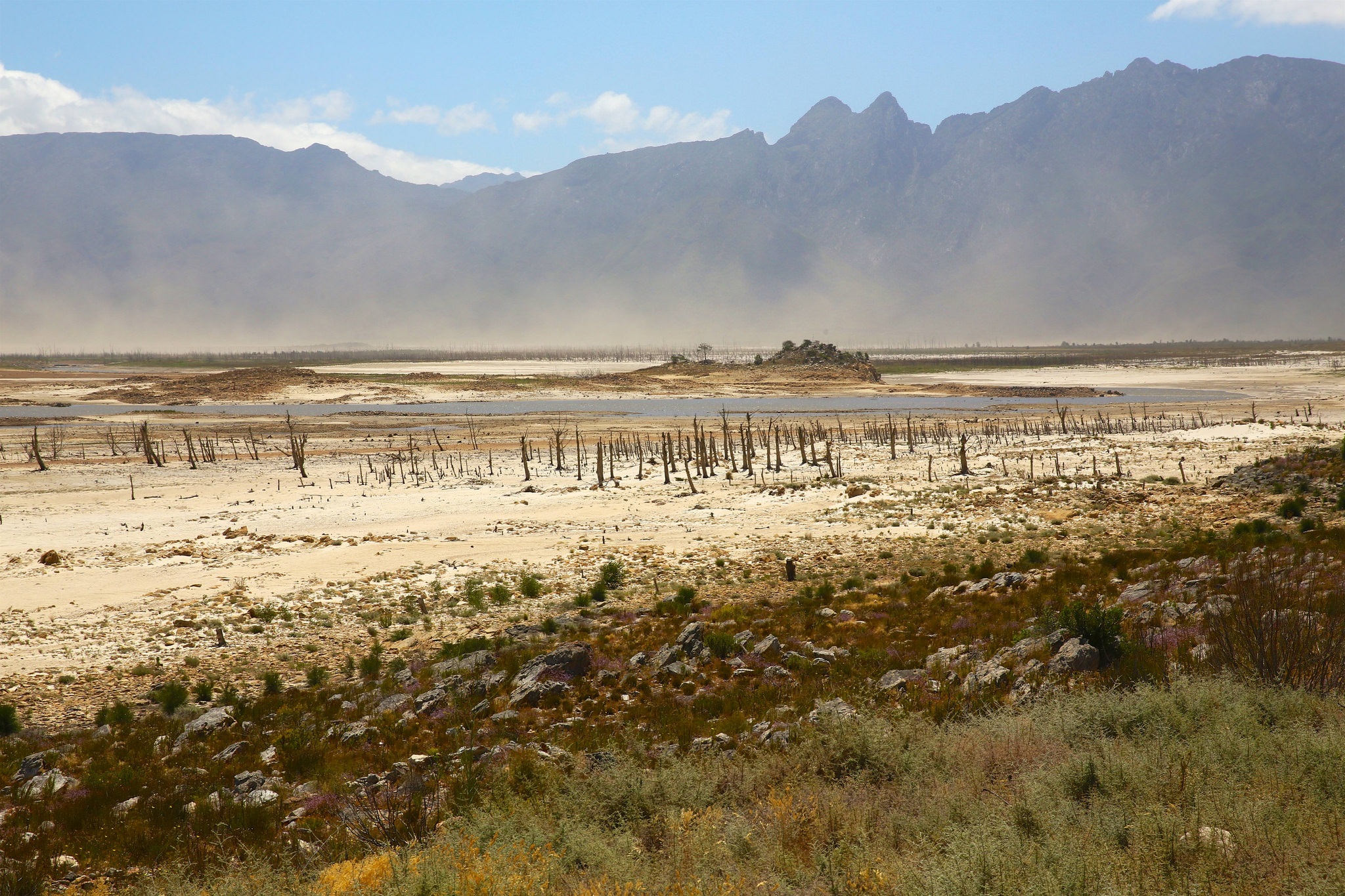
Wind scatters dust at Theewaterskloof Dam, the largest in the Western Cape water system. As of February 12, the dam is only 12 percent full. Photo courtesy of Peter Austin
By Brett Walton, Circle of Blue
Squabbles between South Africa’s politicians over who is to blame for Cape Town’s water emergency reached such a pitch in recent weeks that leaders, in an attempt to soften the debate, invoked the country’s icon of peace and resolve.
“Now as Cape Town and the province of the Western Cape confront a devastating water crisis, we are once again called upon to unite in common struggle against a formidable enemy,” Cyril Ramaphosa, president of the African National Congress, said at an event in Cape Town on February 11 that marked the 28th anniversary of Nelson Mandela’s release from prison.
Ramaphosa was responding to accusations of irresponsibility that were traded between local, provincial, and national politicians. Each group blames the other for a water supply crisis that has spread through the Western Cape and its largest city, Cape Town. These are indeed desperate times, with Cape Town residents being asked to use no more than 50 liters (13 gallons) per person per day.
Western Cape is the only province governed by the Democratic Alliance, the main opposition party to the African National Congress, which has been in power since 1994. By law, the national government is responsible for supplying water to cities, a point that Cape Town and provincial leaders emphasize in their complaints. National ministers, meanwhile, argue that local leaders should have been more forceful in cutting demand and sealing leaky pipes in the city’s water distribution system.
The acrimony is a distraction, argues Anthony Turton, a professor of environmental management at the University of Free State. “This is not helping anybody at all,” he told SABC News on January 26. There will be time later to assign blame, Turton reminded listeners, saying that preventing an urban catastrophe should be the sole task at hand.
While politicians point fingers, those involved in the daily operations of the water system say that their working relationship is focused on keeping water flowing in the Western Cape.
“Blame is not happening at the official level,” Trevor Balzer of the Department of Water and Sanitation told Circle of Blue. “We have good arrangements at the official level and are quite happy with the arrangements in place with local and provincial authorities.”
The Department of Water and Sanitation is responsible for managing the system of dams that supplies nearly 4 million people in Cape Town and surrounding communities with water, and Balzer is coordinating the department’s response to the drought crisis.
Cape Town officials will cut off water service to most homes and businesses when combined storage in the six main dams of the Western Cape water system reaches 13.5 percent, an event they call Day Zero. As of February 12, storage was at 24.9 percent and Day Zero is forecasted to occur on May 11.
Day Zero does not mean no more water from the dams. It means much less water. Engineers with the Department of Water and Sanitation are preparing now to draw from depths of the dams.
The largest dam in the system is Theewaterskloof, which sits outside Cape Town’s natural drainage basin. Water from the dam is transferred to the Berg River basin via an 18-kilometer (11-mile) tunnel through the Franschhoek Mountains.
The tunnel is at the upstream end of Theewaterskloof. When the dam, now at 12 percent, is between 13 percent and 10 percent full, some water will still flow into the tunnel, but any lower than that and the engineers have to work against gravity. “We have to reverse the flow of the river to get water into the tunnel,” Balzer explained.
That requires pumping water uphill. The engineers will excavate the channel that feeds the tunnel and pump water from the dwindling downstream pool into it. Doing this work, however, requires firm ground for the heavy machinery. Balzer said that as the muddy edges of the receding reservoir harden, equipment can be moved into place.
Pumping from the depths opens up an emergency supply that Cape Town, the surrounding communities, and the engineers would rather not have to tap. They do not want to drain the reservoir, Balzer said.
But if needed, dredging and pumping could allow access to more water in Theewaterskloof. Balzer estimates that those emergency measures could draw water in the dam down to 4 percent of capacity.
Balzer said that pumping from the depths would also take place at Voelvlei, the second largest dam in the Western Cape system.
The system itself is configured as a network of canals and dams, but not every community has the same diversity of connections. Cape Town can draw from both Theewaterskloof and Voelvlei. But towns up the cape’s western coast are linked only to Voelvlei. When it drops to 12.5 percent of capacity, Cape Town will no longer receive water from Voelvlei, Balzer said. That will preserve supplies for the towns without connections to other dams. As of February 12, Voelvlei is at 17.3 percent.
“We manage the system so that one community does not have more risk than others,” Balzer said.
Balzer is adamant that Day Zero can be averted with conservation. Emergency supplies from groundwater wells and small desalination facilities are also in the works, though it might be May until they are ready.
“I believe that if we work together that the eventuality of running out of water would not happen,” Balzer reiterated.
Brett writes about agriculture, energy, infrastructure, and the politics and economics of water in the United States. He also writes the Federal Water Tap, Circle of Blue’s weekly digest of U.S. government water news. He is the winner of two Society of Environmental Journalists reporting awards, one of the top honors in American environmental journalism: first place for explanatory reporting for a series on septic system pollution in the United States(2016) and third place for beat reporting in a small market (2014). He received the Sierra Club’s Distinguished Service Award in 2018. Brett lives in Seattle, where he hikes the mountains and bakes pies. Contact Brett Walton



